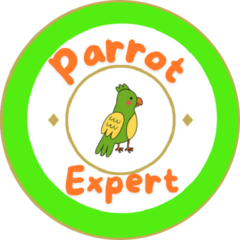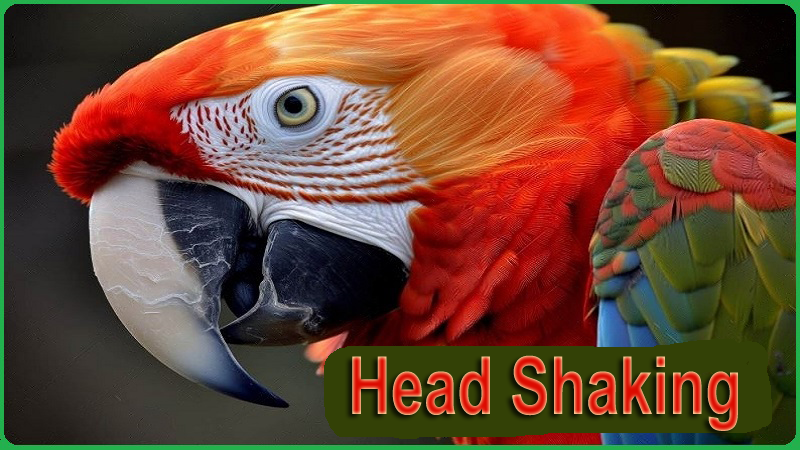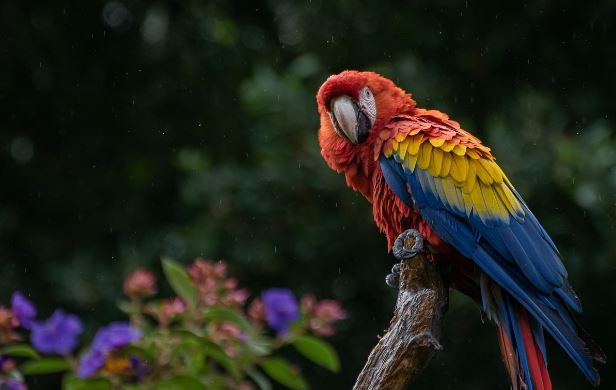Have you wondered about ‘why do parrots shake their heads Up and Down’? Do you want to get know all interesting stuffs about them, if ‘Yes‘! Now, you have come at right page to receive all things regarding parrots head shaking. Let’s get start!!
Parrots are most popular birds worldwide for their intelligence and expressive behaviors. They do often shake their bodies or heads as a natural part of make communication and physical upkeep. Shaking among parrots encompass various actions, each with its own distinct meanings and contexts.
Head shaking in parrots can signify excitement, curiosity, and a form of social interaction. With understanding these behaviors, parrot owners interpret their pets’ moods and needs accurately. Some shaking behaviors are benign and routine; others may indicate underlying health issues or environmental stressors.
Why do Parrots Shake their Head Side to Side? Reasons
There are various reasons that cause your parrots can shake their head side to side. Here are some common reasons why a parrot might shake its head:
Communication
Excitement or Happiness: When a parrot feels happy or excitement, it might shake its head to show these emotions.
Curiosity: As you knows that parrots come in naturally curious creatures. Whenever they receive something new or interesting, they might shake their heads as they try to understand or investigate it.
Discomfort or Irritation
Feathers or Dirt: Sometimes, parrots do shake their heads to dislodge feathers, dust, or dirt that may be causing of discomfort.
Insects or Parasites: If, your parrot has mites or other parasites, then might shake its head to try and alleviate the irritation.

Allergies: Environmental allergens can cause irritation that leading to head shaking
Listening
Sound Localization: By shaking their heads, parrots can better pinpoint the direction and distance of sounds. This is most useful in the wild areas for identifying the predators or other birds.
Attention: When they hear any sound that catches their interest, parrots might shake their heads to focus their attention on this noise.
Food Behavior
Adjustment Food: Parrots also shake their heads to move food around in their beaks, making it easier to swallow.
Excess Water: After drinking, a parrot might shake its head to remove excess water from its beak or face.
Health Issues
Ear Infections: Just like humans, parrots can suffer from ear infections, which can cause discomfort and lead to head shaking.
Respiratory Infections: Infections affecting the sinuses or respiratory tract can cause irritation, prompting a parrot to shake its head.
Neurological Issues: Head shaking can sometimes be a sign of neurological problems. If this behavior is frequent and severe, a visit to the veterinarian is essential.
Mating Behavior
Attracting a Mate: During the mating season, parrot gets head shaking to attract of potential mates. This behavior also often displaying with other courtship behaviors like as singing, dancing, or preening.
Also Read: A Closer Look at African Grey Bite: Causes, Prevention, & Training
Displaying Interest: Your parrots might shake its head to show interest in other birds.
Stress or Anxiety
Environmental Changes: Parrots are sensitive to changes in their environment. Sometimes, unfamiliar people, or new pets can cause stress, and leading to head shaking.
Routine Disruption: Parrots thrive on routine. Any disruption to their daily schedule can cause anxiety and result in head shaking.
Playfulness
Interactive Play: Parrots are intelligent and social birds. They often like in playful behaviors, like as head shaking, make interaction with their owners or other birds.
Exploration: Young parrots, in particular, might shake their heads as they explore and learn about their environment.
Difference between Shaking and Seizure
Parrots shaking or trembling can be a sign of fear, stress, or cold temperatures. This kind of shaking is usually mild and the bird keeps alert and gets control of its movements.
But, a seizure in a parrot includes a complete damage of muscle control and consciousness. During a seizure, the bird may get fall off its perch, jerk spastically, and lose control of its whole bodily functions. Abnormal electrical activity in the brain can lead seizures. Now you have to require quickly veterinary attention.
Cultural and Species Variations
Parrots exhibit head shaking variations based on species and cultural context.
Also Read: Where Do Parrots Live? Exploring Their Diverse Habitats
For instance, African Grey Parrots often shake their heads to mimic human speech rhythms and express curiosity.
Cockatoos frequently shake their heads when excited or during courtship displays, enhancing their communication with raised crests and vocalizations.
Budgerigars use head shaking as a social gesture, greeting or bonding with other budgies or humans, and during preening.
Macaws may shake their heads to signal excitement or adjust food in their beaks.
Culturally, parrots in different environments may develop unique behaviors. In captivity often shake their heads more frequently in response to human interaction. But, wild parrots might do so primarily for communication within their flock.
When to Seek Veterinary Help
If, your parrot’s head shaking is regularly, prolonged, or showing other symptoms such as lethargy, loss of appetite, balance issues, discharge from eyes or nostrils, then immediately take veterinary help.
Frequently head shaking can also indicate underlying health issues like ear infections, respiratory problems, or neurological disorders.
If the parrot head shaking gets severe, results in self-injury, or seizures or uncontrollable muscle contractions, immediate veterinary attention is crucial.
Why do Parrots Shake their Tail Feathers?
Parrots will rapidly wag or flip their tail to show their contentment and happiness, often when greeting their owner.
Tail flaring, where the tail feathers fan out that indicates an excited state and may precede a bite.
Tail preening, where the parrot grooms its tail feathers, shows the bird is relaxed and comfortable in its environment.
Why is My Parrot Shaking When Sleeping?
Parrots can get shiver or tremble when they feel cold. So, you make sure that room temperature is comfortable, around 70-75°F.
Excessive sleeping and shaking are also indication of illness. Older or malnourished parrots may get shake due to their weakness.
But, some shaking is normal behavior when a parrot is waking up or settling down to sleep.
As long as the shaking is brief, the bird is alert and active otherwise. There are no other concerning symptoms, it is likely not a cause for alarm.
Why do Quaker Parrots Shake Their Heads Up and Down?
Head bobbing is a normal behavior in young Quaker parrots, often looking in begging for food. As they mature, some Quakers continue to bob their heads, especially when excited or seeking attention from their owners.
Also Read: Do Cockatiels Talk? A Guide to Their Vocal Talents
Head shaking can also be a sign of contentment and happiness in Quaker birds. When interacting with their favorite people, Quakers may shake their heads as a way to express joy and affection
In some cases, rapid head shaking in Quakers can indicate an overwhelmed or overstimulated state. If the head shaking is accompanied by aggressive behaviors like biting, that means, the bird is becoming agitated and needs a break from interaction
What does It Mean When African Gray Parrot Shakes his Head?
Head shaking can be also a normal behavior in African Gray, often seen when the bird is content, yawning, or trying to dislodge something from its feathers or ear.
Excessive or prolonged head shaking may indicate underlying health problems, such as an ear or sinus infection.
At The End
In the final, parrots head shaking serves many purposes, from communication to physical well-being.
As a responsible parrot owner, you always keep observe your beloved birds closely and seek professional guidance if you suspect concerning patterns.
Also Read: Can Parrotlets Talk? Myth or Reality
Do you have any experience, tips, tricks, or query regarding on this? You can drop a comment!
Have a Nice Day!!





